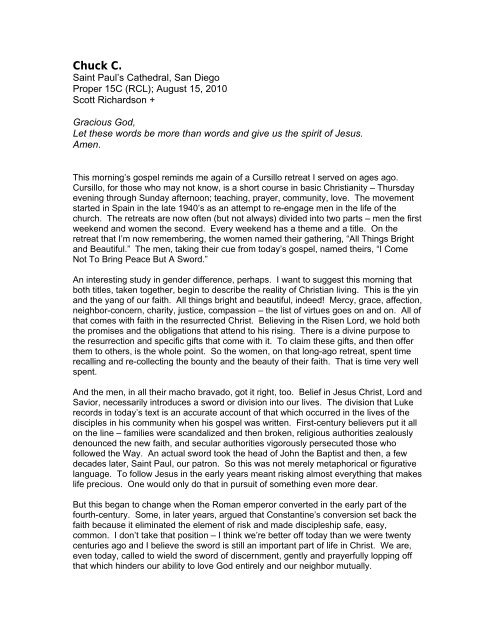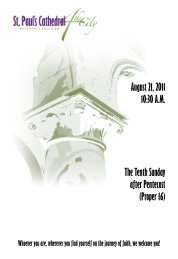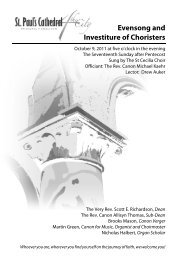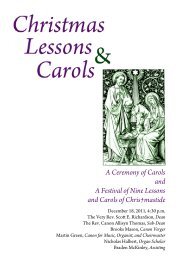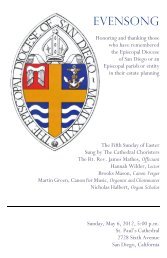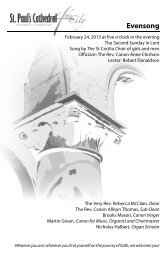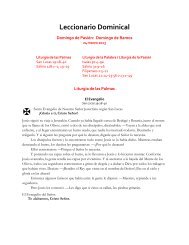Chuck C.pdf - St. Paul's Cathedral (Episcopal)
Chuck C.pdf - St. Paul's Cathedral (Episcopal)
Chuck C.pdf - St. Paul's Cathedral (Episcopal)
Create successful ePaper yourself
Turn your PDF publications into a flip-book with our unique Google optimized e-Paper software.
<strong>Chuck</strong> C.<br />
Saint Paul’s <strong>Cathedral</strong>, San Diego<br />
Proper 15C (RCL); August 15, 2010<br />
Scott Richardson +<br />
Gracious God,<br />
Let these words be more than words and give us the spirit of Jesus.<br />
Amen.<br />
This morning’s gospel reminds me again of a Cursillo retreat I served on ages ago.<br />
Cursillo, for those who may not know, is a short course in basic Christianity – Thursday<br />
evening through Sunday afternoon; teaching, prayer, community, love. The movement<br />
started in Spain in the late 1940’s as an attempt to re-engage men in the life of the<br />
church. The retreats are now often (but not always) divided into two parts – men the first<br />
weekend and women the second. Every weekend has a theme and a title. On the<br />
retreat that I’m now remembering, the women named their gathering, “All Things Bright<br />
and Beautiful.” The men, taking their cue from today’s gospel, named theirs, “I Come<br />
Not To Bring Peace But A Sword.”<br />
An interesting study in gender difference, perhaps. I want to suggest this morning that<br />
both titles, taken together, begin to describe the reality of Christian living. This is the yin<br />
and the yang of our faith. All things bright and beautiful, indeed! Mercy, grace, affection,<br />
neighbor-concern, charity, justice, compassion – the list of virtues goes on and on. All of<br />
that comes with faith in the resurrected Christ. Believing in the Risen Lord, we hold both<br />
the promises and the obligations that attend to his rising. There is a divine purpose to<br />
the resurrection and specific gifts that come with it. To claim these gifts, and then offer<br />
them to others, is the whole point. So the women, on that long-ago retreat, spent time<br />
recalling and re-collecting the bounty and the beauty of their faith. That is time very well<br />
spent.<br />
And the men, in all their macho bravado, got it right, too. Belief in Jesus Christ, Lord and<br />
Savior, necessarily introduces a sword or division into our lives. The division that Luke<br />
records in today’s text is an accurate account of that which occurred in the lives of the<br />
disciples in his community when his gospel was written. First-century believers put it all<br />
on the line – families were scandalized and then broken, religious authorities zealously<br />
denounced the new faith, and secular authorities vigorously persecuted those who<br />
followed the Way. An actual sword took the head of John the Baptist and then, a few<br />
decades later, Saint Paul, our patron. So this was not merely metaphorical or figurative<br />
language. To follow Jesus in the early years meant risking almost everything that makes<br />
life precious. One would only do that in pursuit of something even more dear.<br />
But this began to change when the Roman emperor converted in the early part of the<br />
fourth-century. Some, in later years, argued that Constantine’s conversion set back the<br />
faith because it eliminated the element of risk and made discipleship safe, easy,<br />
common. I don’t take that position – I think we’re better off today than we were twenty<br />
centuries ago and I believe the sword is still an important part of life in Christ. We are,<br />
even today, called to wield the sword of discernment, gently and prayerfully lopping off<br />
that which hinders our ability to love God entirely and our neighbor mutually.
2<br />
So what, you ask, might properly be on the chopping block? Over my vacation I had the<br />
chance to read a book entitled, “A New Pair of Glasses.” The author was Charles<br />
Chamberlain, a.k.a. <strong>Chuck</strong> C., one of the great early lights in AA in this region. He’s also<br />
the father of Richard Chamberlain, the noted actor. The book is an account of a retreat<br />
<strong>Chuck</strong> led at the Pala Mesa resort in 1975. In his drinking days, <strong>Chuck</strong> felt himself cut<br />
off from Life, Good, and God. Those three were synonymous for him. He was cut off<br />
from all three, he later discovered, because of his ego. His definition of ego was “the<br />
feeling of conscious separation from.” In his case, due to his drinking, he was separated<br />
from his wife, his children, his employer, his house, his income, his reputation, his<br />
spirituality – anything and everything that was precious or dear, that held meaning for<br />
him.<br />
Lying in bed in January of 1946, too sick to rise and crushed by his many losses, he<br />
finally died (metaphorically and figuratively speaking). He ceased to matter to himself.<br />
The only reason he wanted to continue living was to rub out just a bit of the record of his<br />
colossal failure. His strategy, born in desperation, was to completely reverse course and<br />
make an oblation, an offering, of himself to his family and to the world. His wife was<br />
divorcing him; before she left, he said to her, “Honey, it’s no longer of any importance to<br />
me whether or not I live under this roof… I’ll never ask a thing of you as long as I live,<br />
but one. If I can ever add anything to your life, let me give it to you.”<br />
The kids were next: “Boys, there’s no father in the household any longer. You don’t<br />
need to love me, you don’t need to obey me, I’ll never ask a thing of you as long as you<br />
live, but one. If I ever have anything – be it money, counsel, or blood – that will add to<br />
your life, let me give it to you.” With those two offerings, and with the good work that<br />
followed, his home was healed.<br />
His boss (the same man who threatened to throw him out the window if he ever set foot<br />
on the plant again) was third in line. <strong>Chuck</strong> showed up for work after a three-week toot.<br />
The boss burst into his office steaming. <strong>Chuck</strong> told his boss to calm down. He was<br />
there to work for free until he could catch up with the things he should have been doing<br />
all along. After that, he’d leave on his own. The boss would never owe him another<br />
penny. Eleven years later he owned the company. Far more importantly, he never took<br />
another drink or swallowed another pill.<br />
One might say that <strong>Chuck</strong> C. didn’t wield the sword so much as fall on it. He gave up.<br />
He surrendered. He died and rose. He decided that he didn’t need to fight everything<br />
and everybody anymore. He opted to let God be God. He turned toward service. He<br />
gave himself absolutely, completely trusting God to care for him as long as he listened<br />
and followed. The feeling of “conscious separation from” gave way to a deep connection<br />
to others and to God, a living relationship that lasted until and, I trust, beyond his death<br />
in 1984.<br />
I mention <strong>Chuck</strong>’s story because I’m sure there’s a universal theme embedded within it.<br />
The truth is, drinking, finally, wasn’t <strong>Chuck</strong>’s primary issue. Ego-based separation,<br />
always feeling outside, apart, above and beyond, was the issue – his drinking was a<br />
symptom of that. When he put on a new pair of glasses, when he flipped almost<br />
everything he’d been taught about life, when he let loose his ego, when he gave up outthinking,<br />
out-performing, and out-maneuvering others, when he stopped nurturing his<br />
resentments, when he committed himself to loving every single human being on planet<br />
earth, when he ceased to care how others viewed him, when he put away rationalizing,
3<br />
minimizing, and denying, when he was able to view life from a entirely different<br />
perspective (giving, not gaining; serving, not being served; standing under, not lording<br />
over) then a new path, the right path, God’s path, appeared before him. His despair<br />
gave way to joy and he became an immensely useful human being – the fulfillment of his<br />
best hope for himself.<br />
<strong>Chuck</strong> C. rubbed out the record, and then some. All things, so bright and so beautiful,<br />
were his. And here’s the kicker; they had been his all along, he just didn’t know it. It<br />
was all a free gift from the very start and from a loving God, the God of his own<br />
understanding discovered in a life of service.<br />
Again, I share his story knowing that, while the details may differ, the hope is shared by<br />
all, whether we’re conscious of it or not. We want to be in right relationship with our<br />
God, our neighbor and ourselves. And we want that more than anything else in life. We<br />
will go to any lengths to attain that. That is the pearl of great price, that which we will die<br />
for. The good news is we don’t have to die. The thing we’re looking for, <strong>Chuck</strong> liked to<br />
say, is the thing we’re looking with. It is right here, right now, fully present, immediately<br />
available. The kingdom of God is within you, Jesus said. May we, in our inward quest,<br />
in our personal and unique journey, be as blessed in the discovering as that selfdescribed<br />
tongue-chewing, babbling, idiot (and I would add glorious) drunk. Amen.


